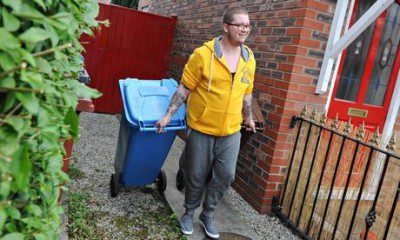Neighbours are asked to smile as part of social experiment in UK communities

The Essex Police Neighbourhood Watch Liaison regularly issues reports and advice which are reported once a month on this site in the monthly crime update – this item we have received seems too novel and interesting to leave to the month-end compilation – enjoy and,don’t forget, SMILE:-
Do you smile at the people next door, pat their cats and dogs, take out their bins or know their names? If so, you are very much in a minority, as British people have been revealed as a reserved lot who don’t know their neighbours.
According to new research, one in 10 UK residents can’t name a single one of their neighbours, while less than a fifth of people know the names of even their immediate neighbours. But they would like to: almost two-thirds (65%) of people say their neighbourhood would be a “stronger” and safer place if people were encouraged to get to know each other better.
In a survey and a follow-up social experiment carried out to mark the 50th anniversary of the Neighbourhood Watch network, people were questioned about their connection with their local community. Less than a quarter of those surveyed said they felt a sense of belonging, but there was a clear sense of craving for neighbourly contact.
Neighbourhood Watch carried out the study with price comparison website comparethemarket.com. Then, taking one ordinary street, a social anthropologist was drafted in to work with a selected number of residents to get them to let go of their British inhibitions and reach out to the people they lived alongside.
In the month-long experiment, the participants – who all lived on suburban Lingard Road in Manchester – were asked to keep a diary of how they got on. Five households had strict instructions to smile at people in the street and offer help where they could, and to try to strike up conversations. Although several reported “strange looks” and some initial reserve, by the end of the four weeks all the Lingard Road participants reported success.
I’ve really seen a difference. People I’ve never met before have been a bit more sociable and said hello on several occasions. The study has been useful and really proven that we are a nice little street with a small community,
… said Jay Crawford, who had lived in the area for 24 years without plucking up the courage to talk to anyone, but now is delighted to be running a bin rota with his new friendly neighbours.
Social anthropologist Kate Fox, director at the Social Issues Research Centre in Oxford, said the experiment tapped in to a very real desire to be part of a community.
“The activity confirms my own findings that the English or British reserve stereotype is misleading,”
she said.
We are not reserved in the sense of introverted or misanthropic or unsociable: we are social animals just like all other humans, and have the same need for a sense of community and belonging. We are just a bit more socially awkward than other nations – and have stricter unwritten rules about privacy, not talking to strangers, and that kind of thing.
So we need more props and facilitators – pubs, clubs, pets, sports, games, weather-talk, alcohol, internet – to break the ice and get us interacting with each other.
Fox believes only the smallest “nudge” is needed to get people building a better neighbourhood.
The experiment shows even very small gestures, saying hello, can have a significant positive effect on a neighbourhood.

